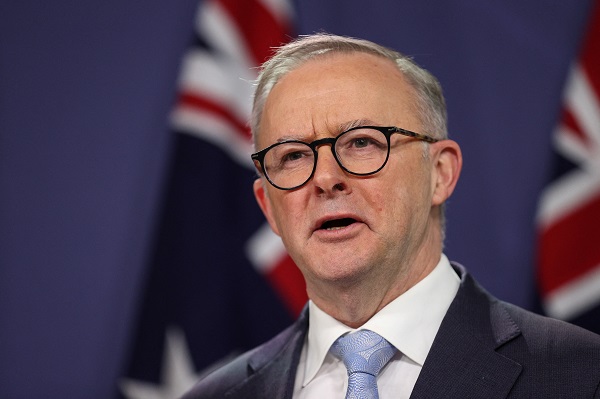 Australian Prime Minister Anthony Albanese speaks during a joint press conference with New Zealand Prime Minister Jacinda Ardern following a meeting at the Commonwealth Parliamentary Offices in Sydney, Australia, 10 June 2022;
Credit: Reuters / Loren Elliott
Australian Prime Minister Anthony Albanese speaks during a joint press conference with New Zealand Prime Minister Jacinda Ardern following a meeting at the Commonwealth Parliamentary Offices in Sydney, Australia, 10 June 2022;
Credit: Reuters / Loren Elliott
(Reuters) - Australia's new Labor-led government has reached a €555 million ($583.58 million) settlement over a controversial decision last year to scrap the French submarine deal, a move Canberra hopes will help repair the rift between the two countries.
Australia last year cancelled a multi-billion-dollar order for submarines with French military shipyard Naval Group and opted instead for an alternative deal with the United States (US) and the United Kingdom (UK).
The move enraged Paris and triggered an unprecedented diplomatic crisis. It has also riled China, the major rising power in the Indo-Pacific region.
On Saturday 11 June 2022, Australia Prime Minister Anthony Albanese said in a news conference in Sydney that his government had reached a "fair and equitable" settlement with Naval Group.
The cancellation last year of Canberra's order for a new conventional submarine fleet with Naval Group - valued at $40 billion in 2016 and reckoned to cost much more today - came after the previous government signed a trilateral security partnership with the US and the UK.
The trilateral deal was for a fleet of nuclear-powered submarines with US and British technology.
Anthony Albanese said the settlement would allow Australia to move forward in its relationship with France.
"Given the gravity of the challenges that we face both in the region and globally, it is essential that Australia and France once again unite to defend our shared principles and interests", Mr Albanese said in a separate statement.
Australia, the US, France and its partners have all expressed concern about China's growing influence in the Pacific, a region that has traditionally been under their sway. Their concerns increased after China and the Solomon Island's signed a security pact earlier in the year.
"We deeply respect France’s role and active engagement in the Indo-Pacific", Anthony Albanese said.
He added he was looking forward to taking up French President Emmanuel Macron's invitation to visit Paris.








